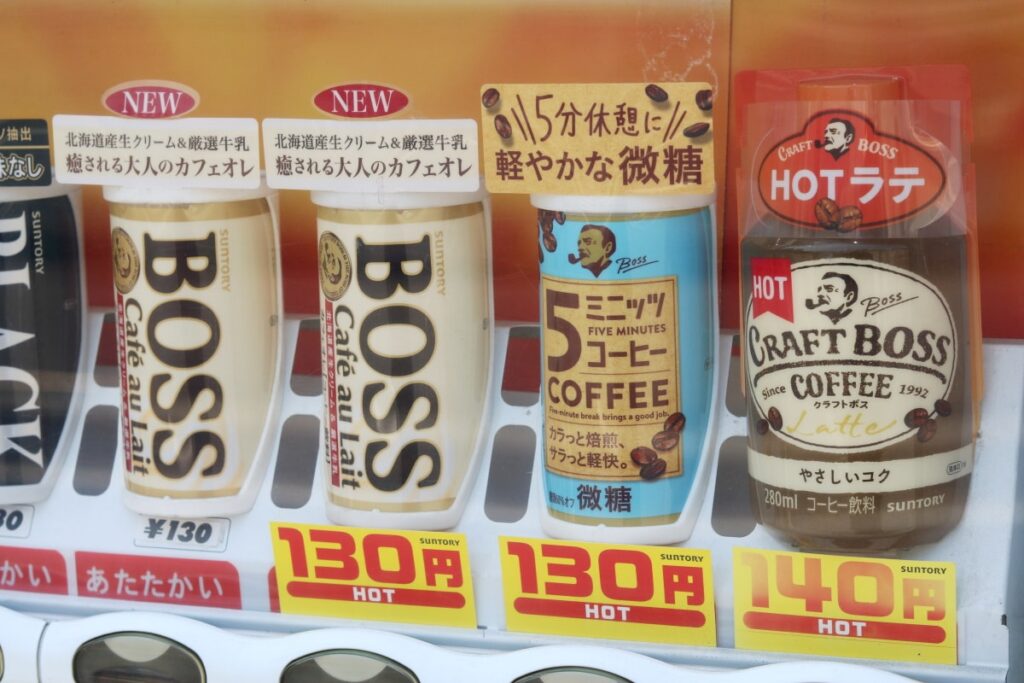[ad_1]
If you’ve ever visited a Japanese convenience store or bought a drink from a Japanese vending machine, you’ve probably seen it. Narrow metallic cans, some plain in color, others glittering with rainbow hues. All decorated with the same image: the profile of a stern-looking man, old-fashioned pipe eternally caught between his teeth. This is Boss Coffee, one of Japan’s most recognizable canned coffee brands.
To celebrate the brand, which turns 30 in 2022, this article looks at the history of Japan’s favorite coffee.
Why Canned Coffee?
The history of canned coffee in Japan does not, unfortunately, begin with Boss. The oldest brand of canned coffee – as recognized by the Guinness Book of World Records – comes from Ueshima Coffee Co. UCC began selling the product in 1969.
Canned coffee originated as a way to make coffee easier for busy salarymen to buy and drink during their commute. Reportedly, Ueshima Tadao, the company’s founder, came up with the idea when he purchased a hot coffee at a train station but was immediately forced to abandon the un-drunk beverage when his train arrived shortly thereafter[1].
Canned coffee’s popularity skyrocketed in the following years. Today, over a dozen brands of canned coffee can be found in Japan. Popular brands include Fire, Georgia, Nescafe, Coffee Time, Cafe La Mode, and, of course, Boss.
A single can of coffee generally costs between 50 and 200 yen. This makes canned coffee one of the more affordable vending machine/convenience store beverages. A survey conducted annually revealed that the average Japanese person drinks between 90 and 100 cans of coffee per year. However, that number declined steeply in 2020 and 2021 due to quarantines associated with the COVID-19 pandemic[2].
Boss Coffee Uses Special Brewing Techniques

Boss Coffee was first introduced in 1992 by Suntory, a beverage company that also produces whisky, beer, iced tea, Orangina, and the lemon soda C. C. Lemon. Suntory sells coffee in both cans and plastic bottles, but the cans are far more well-known. The company’s logo was designed to resemble an “ideal boss” and may have been inspired by images of author William Faulkner.
After decades of popularity in Japan, Boss Coffee spread to the United States, Australia, and New Zealand in 2019. Despite a decrease in sales during the COVID-19 pandemic, the international launch of Boss Coffee was successful and it continues to be sold around the world today.
The distinctive taste of Boss Coffee comes from its unique brewing process, known as the “Flash Brew.” The coffee is not made in the cold brew style. It is first brewed hot, then rapidly chilled within seconds to lock in the rich flavor.
When Boss Coffee first launched, it was available in only a single flavor, the rather basic “Super Blend.” Today, you can find a variety of delicious Boss Coffee flavors for sale. Some of the most popular and iconic include Boss BLACK, which features no milk or sugar, Boss Cafe au Lait, which has a milder taste and a lot of milk and sugar, and Boss Rainbow Mountain, a rich blend made from beans from seven Guatemalan growing regions. Boss Rainbow, known for its rainbow-colored can, is one of the most recognizable types of canned coffee. The company has also released several limited-time flavors, typically some variety of latte.[3]
Tommy Lee Jones and the Iconic Boss Coffee Ads

Beginning in 2006, Boss Coffee produced a series of television ads featuring American actor Tommy Lee Jones. Jones, best known for his roles in serious and dark films such as The Fugitive and No Country for Old Men, plays an alien attempting to adapt to Japanese culture. Different ads have Jones participating in various scenes, including driving a taxi or serving as a substitute teacher. In each case, Jones’ deadpan attitude and alien powers make the situation more difficult, but he is able to relax by enjoying a can of Boss Coffee. Jones reportedly enjoys working on these ads, and has visited Japan several times outside of his work with Boss Coffee. [4]
Although the sales of Boss Coffee have declined in the past years due to people staying inside and commuting less frequently, experts project it will recover. And Suntory is busy crafting new products to ensure that happens.
In 2022, Suntory released the All-Star blend to celebrate the coffee’s 30th anniversary. This blend combined five of Boss Coffee’s past flavors into a single drink and was sold for a limited time in 2022. Boss also collaborated with Nintendo to produce new commercials starring the video game character Kirby enjoying a delicious can or bottle of Boss.[5]
If you’ve never tried canned coffee, then Boss is a great place to start, especially as it is now available worldwide. If you’re ever standing in front of a Japanese vending machine unsure about what to buy, why not try a classic can of Boss Coffee? It will give you energy throughout the day while also providing a delicious taste for you to enjoy. Here at Unseen Japan, we particularly recommend Boss Rainbow – it’s one of our favorites.
Happy 30th Anniversary to Boss Coffee – here’s to 30 more years of coffee in a can!
Sources
[1] UCC Ueshima Coffee Company. “コーヒーはどんな歴史を歩んできたのでしょうか.” UCC Official Web site. Link.
[2] Diep, C. “Canned coffee consumption index in Japan 2011-2020.” Statista. 21 March 2022. Link.
[3] Suntory Official Web site. “Boss Coffee 2022 Lineup.” Link.
[4] PR Times. “「BOSS」発売30周年 新TV-CM 9月1日オンエア開始 中島みゆきさんふんする“宇宙大統領”が初登場 BOSSとNetflixがコラボした「ボスフリ」キャンペーンも9月1日からスタート!” 1 September 2022. Link.
[5] Whitehead, Thomas. “Random: Kirby Coffee Is Now a Thing in Japan, With Amazing Commercials.” Nintendo Life. 4 April 2022. Link.
[ad_2]
Source link


